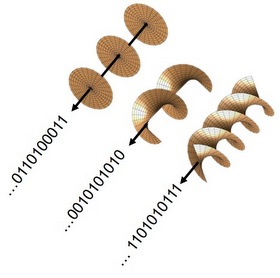Oct 19 2015
In the latest advance to boost the speed of the Internet, a research team including, the City College of New York, University of Southern California, University of Glasgow, and Corning Incorporated, has demonstrated a way to increase the data speeds of optical fibers - considered the Internet's backbone.
 "Twisted data" - Multiple data streams are transmitted and received as different twists of light.
"Twisted data" - Multiple data streams are transmitted and received as different twists of light.
"Optical fibers can be sped up by 'twisting' data; multiple data streams are transmitted and received as different twists of light," says Giovanni Milione, a City College doctoral student at the time. "Thought impossible using standard optical fibers which untwist the data, corrupting it, we showed that if the data was digitally re-twisted, after it was received, it could be recovered."
To digitally re-twist the data, the researchers borrowed a well-known technique of radio communication, referred to as 'MIMO,' used by cell phones and Wi-Fi routers every day. "Light's twists were treated like antennas," Milione explains. "Even if transmitted data was untwisted, it was received as a different twist (antenna) and recovered."
As a proof of principal, the researchers successfully transmitted four data streams on four twists of light over 5 kilometers of standard optical fiber. A key to their experiment was a University of Glasgow-made device that separates and combines light's twists as a prism does color.
"This development could offer a solution to the insatiable needs of data-driven social media, such as, Facebook and YouTube, which continually push optical fiber data speed limits," said Distinguished Professor of Physics Robert R. Alfano.
Source: http://www2.ccny.cuny.edu